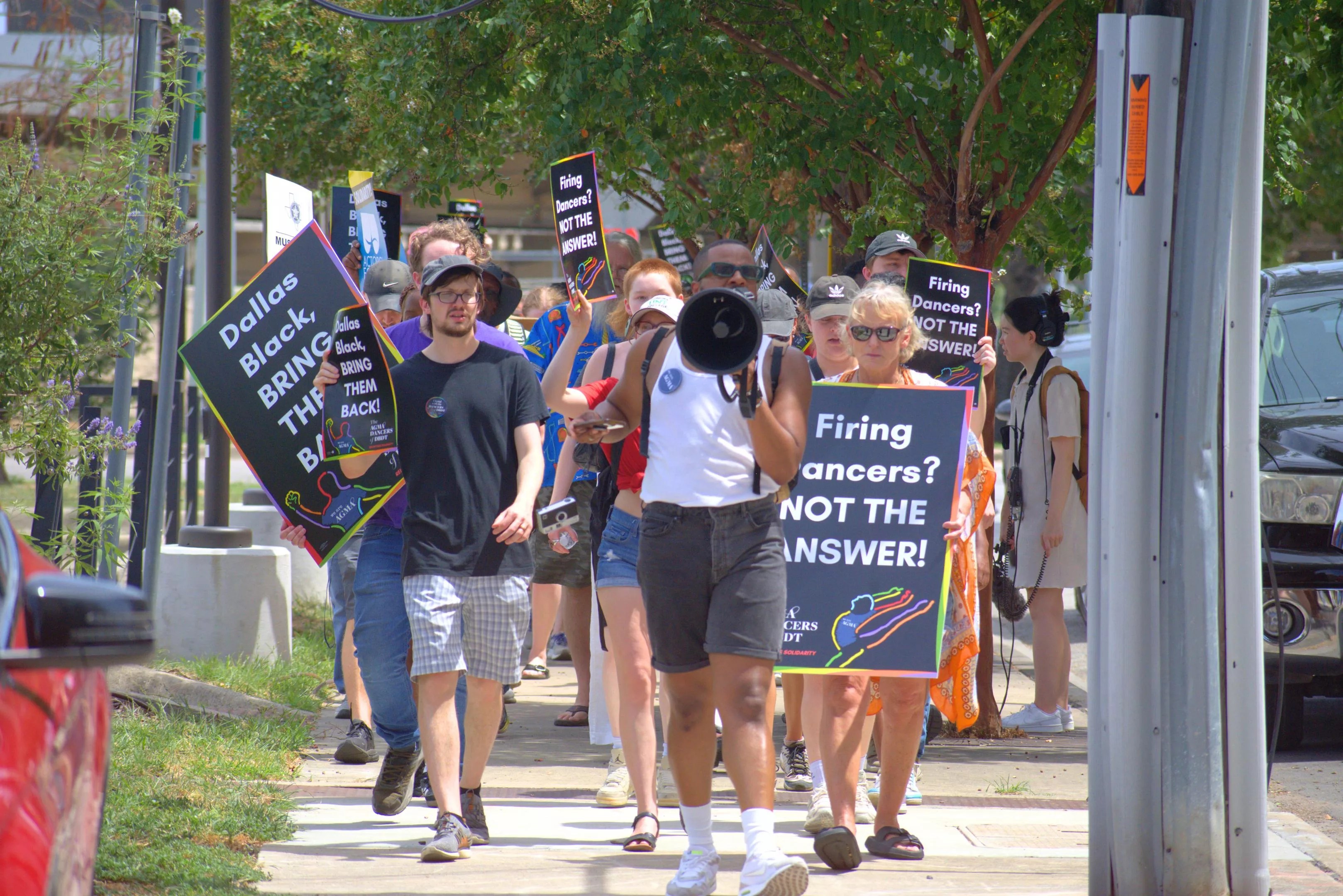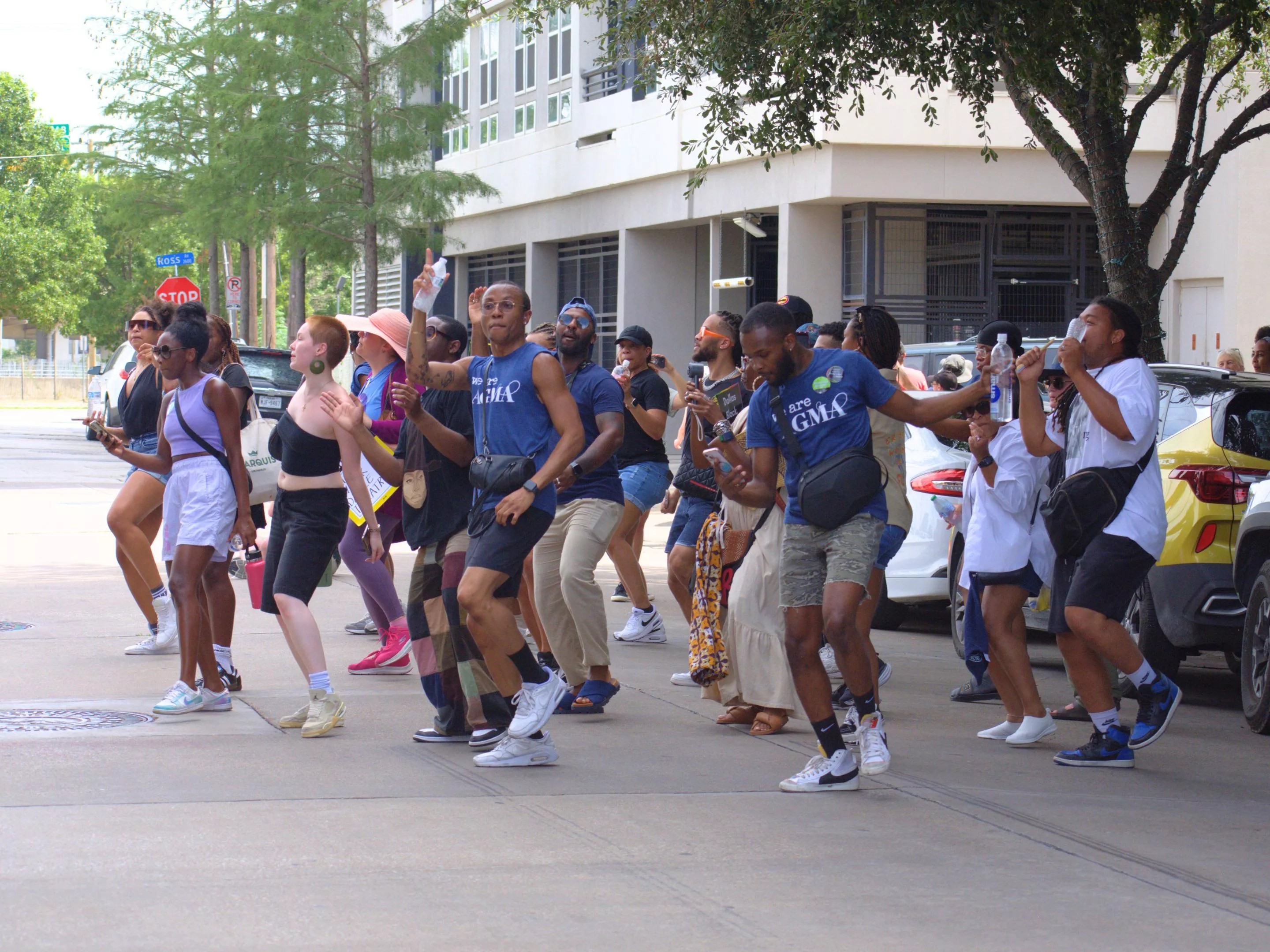
Vanessa Quilantan

Audio By Carbonatix
The Dallas City Council voted to put a hold on a $248,435 grant to Dallas Black Dance Theatre while the city and the National Labor Relations Board investigate allegations that the dance company engaged in union busting.
DBDT fired its entire main company at the end of August, shortly after dancers established a labor union under the American Guild of Musical Artists (AGMA).
DBDT claims the firings came after the dancers posted an improper video on social media. It denies any link to the unionization effort.
City Council’s Quality of Life, Arts, and Culture Committee proposed a motion to pause the approval process for Dallas Black Dance Theatre’s $248,435 grant on Monday after the Office of Arts and Culture presented its list of recommended organizations to receive contracts for the 2024-25 fiscal year. On Wednesday, the full council voted to pause the DBDT grant.
Will you step up to support Dallas Observer this year?
At the Dallas Observer, we’re small and scrappy — and we make the most of every dollar from our supporters. Right now, we’re $14,000 away from reaching our December 31 goal of $30,000. If you’ve ever learned something new, stayed informed, or felt more connected because of the Dallas Observer, now’s the time to give back.
Dallas’ director of the Office of Arts & Culture, Martine Elyse Philippe, told the committee that Dallas Black Dance Theatre was included in the department’s funding recommendations compiled this past spring. The $248,435 city grant is $55,491 less than the combined salaries paid out to the dance company’s executive director Zenetta S Drew and founder Ann Williams in 2022.
Then came the mass firings, which prompted a review by city attorneys that found DBDT did not breach its city contract with the firings.
That wasn’t good enough for City Council members who chose to withhold the money, at least for now.
“I think that there was a clear display of union busting within the organization,” committee member and Deputy Mayor Pro Tem Adam Bazaldua told Philippe. “And I will say it like it is: I don’t believe that this is indicative of what the city of Dallas stands for when it comes to our support for labor, specifically. I definitely do not support the level of funding that has been laid out for the Dallas Black Dance Theatre, specifically because of what we’ve seen.”
Council member Gay Donnell Willis also weighed in with criticism.
“I mean, I had The New York Times calling me last week [about Dallas Black Dance Theatre], and it wasn’t favorable,” she said.
Most of the 14 performers fired by Dallas Black Dance Theatre attended Wednesday’s council meeting to support the motion to withhold funding.
The dancers complain of punitive, heavy-handed management by DBDT. They told the Dallas Observer in August they endured low wages, overwork, disciplinary action for attempting to communicate with leadership, a lack of physical therapy for performance injuries, inability to negotiate employment contracts and the policing of African American hair styles. One fired DBDT employee who spoke during the meeting described working in a “roach-ridden” facility where thermostats were caged with locks last year to prevent dancers from adjusting the room temperature during intensively athletic rehearsals.
City Council was also treated to a rare appearance from DBDT leadership by board President Georgia Scaife, who was questioned about the organization’s lack of response to the allegations. Scaife said Dallas Black Dance Theatre had not been aware of the Quality of Life, Arts and Culture Committee meeting on Monday, nor that DBDT would be a topic of discussion at the meeting. She also said a copy of the city’s report on labor practices hadn’t been requested by the organization until Wednesday, despite being filed by the Inspector General’s office on Oct. 7.
Scaife would not speak on internal workplace policies at DBDT, stating only that negotiations with AGMA for a collective bargaining agreement begin next week. Though the city grant accounts historically for 7% of the DBDT’s budget, Scaife said the loss of city funding would limit the the theatre’s programming and harm students’ educational access.
Council members Carolyn King Arnold (chair of the Workforce, Education & Equity Committee) and Zarin Gracey (a member of the Quality of Life, Arts, and Culture Committee) both expressed a desire to protect the legacy and future of Dallas Black Dance Theatre.
“While this action from a labor perspective is an egregious one, I’m not going to deny that at all, I don’t want this instance to impact years of impact that Dallas Black Dance Theatre has had in the community,” Gracey said. “So what I don’t want to happen is that because of this moment, this forever becomes the stain on the Dallas Black Dance Theatre, and they can never get back to where they were or continue to grow because of that.”
Bazaldua countered that the city has its own interests to protect, too.
“I don’t believe that this discussion changes the fact that [Dallas Black Dance Theatre] is absolutely cherished by our city.” he said. “But what’s not cherished by our city is the allegations that have come forward. And if we’re not willing to differentiate between the nostalgia of an organization without holding them accountable to the city’s priorities, then we’re not doing our job. […] We do not have sacred cows in this city.”
Councilman Omar Narvaez brought up the City Council’s scrutiny and investigation of the Dallas Arboretum in recent years after LGBTQ+ civil rights organization Lambda Legal filed multiple complaints with the Equal Employment Opportunity Commission against it in 2021 and 2022, illustrating that no cultural organizations in Dallas are above reproach.

Dancing in the streets rings loud during protests of Dallas Black Dance Theatre’s problematic labor practices.
Vanessa Quilantan
Council member Jaynie Schultz said a partnership like the one between the city and Dallas Black Dance Theatre only functions if both parties are working together toward a common goal.
“We as a city are partners with tens if not hundreds of agencies across the city. In this case, we really become philanthropic partners,” Shultz said. “And when you are philanthropic partners, you have an opportunity to work together without recrimination, without judgment, without anger, with all those things to say, ‘How can we help you be better?'”
The motion that passed does not cancel the organization’s funding outright, but it does add a couple of months to the city’s process of determining whether to proceed with funding. Unless it can squeeze in a special meeting before then, the Office of Arts & Culture will convene on Nov. 7 for further deliberations. On Nov. 21, it will present its recommendations, which will go before City Council review on Dec. 3.
Dallas City Council members broadly agree that this process should not be left to stagger on and want this funding determination resolved as quickly as possible. But it’s pretty far-fetched to assume that the National Labor Relations Board will produce case rulings on the multiple charges filed against Dallas Black Dance Theatre soon. These kinds of federal proceedings can take anywhere from months to years.
The committee and council’s decision on whether to fund DBDT will likely come down to the organization’s cooperation with the city’s fact-finding and how things shake out at the bargaining table with AGMA. The union has stated that its primary demand is the reinstatement of all 14 terminated dancers.